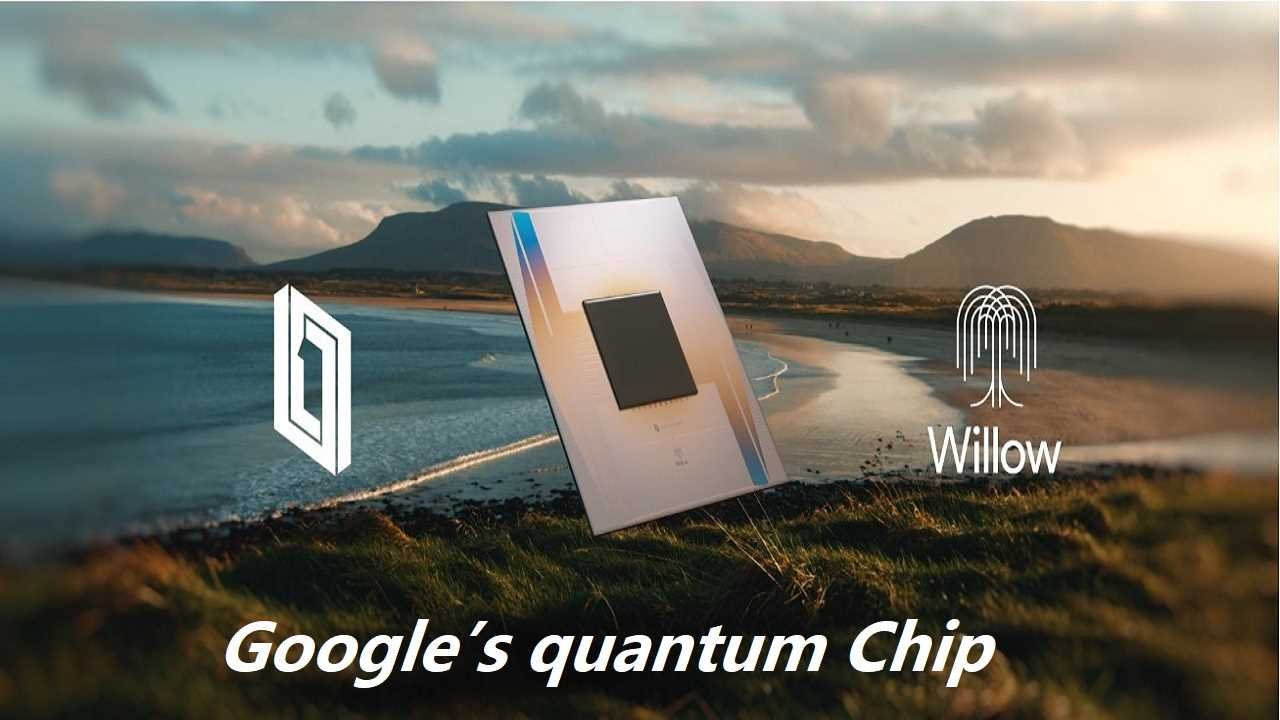Google Willow Quantum Computing Chip:- In a groundbreaking move, Google has unveiled its latest quantum chip, Willow, capturing the attention of tech enthusiasts and industry leaders worldwide. With quantum computing poised to redefine the boundaries of modern technology, this new chip marks a significant milestone in Google’s quest to develop large-scale, practical quantum systems. The Willow chip, developed by Google’s Quantum AI team, has generated a flurry of excitement across the tech world, including a highly publicized exchange between Google CEO Sundar Pichai and Elon Musk, the CEO of SpaceX.

Table of Contents
Google Willow Quantum Computing Chip
Google’s Willow quantum chip has been hailed as a game-changer in the realm of quantum computing. The chip boasts advanced error-correction capabilities that represent a significant step forward in solving one of the most persistent challenges in quantum computing: error mitigation. Quantum computers rely on quantum bits, or qubits, which can exist in multiple states simultaneously due to quantum superposition. However, these qubits are extremely fragile, making them highly susceptible to errors during computation. Until now, effectively correcting these errors without disrupting the quantum states has been a major hurdle.
Willow addresses this issue head-on, with an improved error-correction framework that brings Google closer to achieving scalable, practical quantum systems. The chip’s enhanced performance allows it to perform complex calculations at a speed and efficiency that was previously thought to be out of reach. According to Google, this breakthrough represents a critical step toward building a large-scale quantum computer capable of tackling real-world problems.
The Promise of Quantum Computing in Space
The notion of a quantum cluster in space may sound like science fiction, but many see it as a logical next step for the rapidly advancing field of quantum technology. The idea is based on the premise that quantum computers could eventually be used to solve problems too complex for current systems, such as modeling climate change, simulating molecular interactions for drug development, or optimizing large-scale logistical systems. By deploying quantum computing clusters in space, researchers could tap into the vast resources and unique conditions of space to push the boundaries of what’s possible.
This bold vision resonates with many in the tech community. One user on X commented, “Quantum mechanics in action. Will be keen to see it in space application soon. Quantum cluster space data center sounds like the way to go forward! Keep it coming.” The thought of quantum computers operating beyond Earth’s atmosphere is an exciting prospect, blending cutting-edge technology with the endless possibilities of space exploration.
The Impact on Cryptography and Decentralized Finance
While the excitement around Willow is palpable, its implications reach far beyond space exploration. One area where quantum computing could have a profound impact is cryptography. As quantum computers advance, they will possess the ability to break encryption protocols that are currently deemed unbreakable by classical computers. This is especially concerning for industries that rely on robust encryption systems to secure data, such as banking, communications, and cryptocurrencies like Bitcoin.
One Reddit user highlighted this concern, stating, “Quantum computing was always the Sword of Damocles hanging over cryptography, and it just took a massive step closer. If Willow can solve in five minutes what a supercomputer takes 10^25 years to crack, Bitcoin’s encryption is definitely on borrowed time.” This comment underscores the potential threat posed by quantum computing to the foundations of modern cryptography. The possibility that quantum systems could render traditional encryption obsolete has sparked discussions about the need for post-quantum cryptography solutions to safeguard sensitive data and digital currencies.
As the capabilities of quantum computers like Willow evolve, experts are urging the development of new cryptographic protocols designed to withstand the power of quantum computation. The urgency for a “post-quantum” security framework is growing as more organizations prepare for the eventual rise of quantum computing.
The Road Ahead for Quantum Computing
Despite the breakthroughs that Willow represents, the journey toward practical, large-scale quantum computing is still in its early stages. Google’s Quantum AI team has made tremendous strides, but many challenges remain, particularly around scaling quantum systems and developing algorithms that can leverage their unique capabilities. Moreover, the high cost and complexity of building and maintaining quantum hardware remain significant barriers to widespread adoption.
However, the unveiling of Willow signifies that we are entering a new era in computing, where the impossible becomes possible. With companies like Google leading the charge, the future of quantum technology looks increasingly promising. The collaboration between Google and SpaceX could play a pivotal role in advancing the field, combining quantum computing’s potential with the limitless possibilities of space exploration.
In conclusion, Google’s Willow quantum chip is more than just a technical achievement—it is a glimpse into the future of computing. Whether it is harnessing the power of quantum mechanics to solve complex problems on Earth or utilizing quantum clusters in space, the launch of Willow marks a thrilling new chapter in the evolution of technology. As the world watches, we are reminded that the true impact of quantum computing is only just beginning to unfold.
